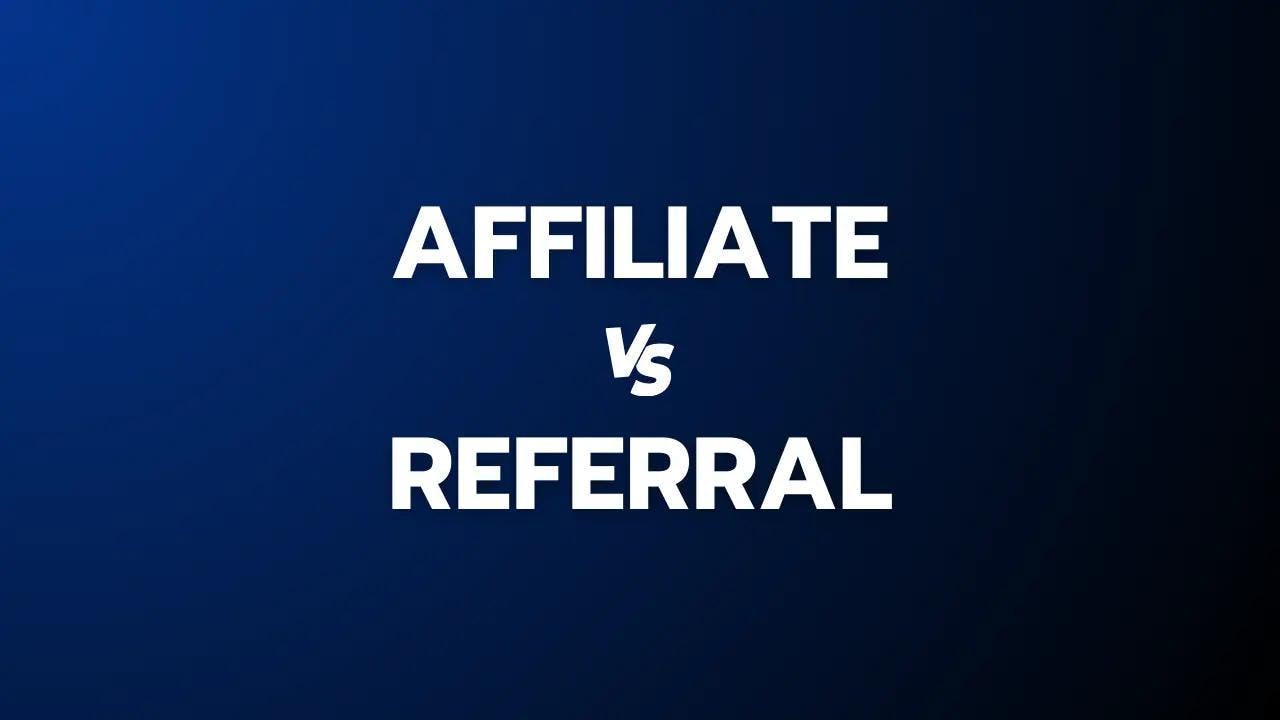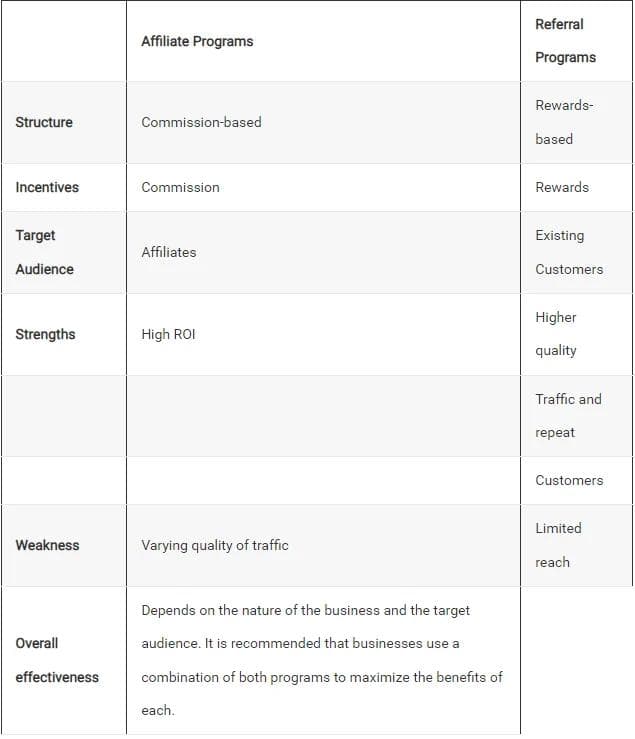
Affiliate vs Referral Programs: Which is Best for Your Business in 2023?
Unbeatable Software
May 14, 2023 at 5:08 PM
In the ever-evolving globe, businesses constantly innovate to expand their customer base and increase sales. Two popular strategies for achieving this goal are affiliate and referral programs.
Both programs rely on incentivizing others to promote your business, but they differ in key ways. So, affiliate vs referral programs which is best for your business?
In this article, we’ll explore the differences between affiliate and referral programs and provide guidance on how to choose the program that’s right for you.
Importance of choosing the right program for your business.
Choosing the right program for your business is important because it can impact your sales and customer engagement. An affiliate program may be more suitable for businesses that want to increase brand exposure and reach a larger audience.
Meanwhile, a referral program may be more suitable for businesses that want to build customer loyalty and encourage repeat business. Ultimately, the key to choosing the right program is to evaluate your business needs and marketing goals.
In the following sections, we’ll explore the differences between affiliate and referral programs in more detail and provide examples of successful programs. We’ll also discuss the strengths and weaknesses of each program and help you make an informed decision on which program is best for your business.
Affiliate vs Referral Programs Comparison chart
To help readers make an informed decision, the following chart summarises the key differences between affiliate and referral programs:

What are Affiliate Programs?
What are they?
Affiliate programs are a popular marketing strategy that allows businesses to leverage the power of affiliates to promote their products or services. Affiliates are typically bloggers, social media influencers, or other individuals who promote products or services to their followers. Affiliates earn a commission for every sale that is made through their unique affiliate link.
How do they work?
Affiliate programs work by providing affiliates with a unique link or promo code that they can share with their followers. When someone clicks on the link or uses the promo code to make a purchase, the affiliate earns a commission on the sale.
The benefits of using affiliate programs
There are many benefits to using affiliate programs for your business. One of the primary benefits is increased brand exposure.
When you work with affiliates, you can tap into their network of followers and reach a larger audience. It can increase brand awareness and drive more traffic to your website.
Another benefit of using affiliate programs is increased sales. Affiliates are motivated to promote your products or services because they earn a commission on each sale. It means that you can generate more sales without having to invest as much time or resources into marketing your products or services.
Examples of successful affiliate programs
There are many successful affiliate programs that have helped businesses achieve success. One example is the Amazon Associates program. The program is free to join and offers a wide range of products for affiliates to promote.
Another successful affiliate program is the Shopify Affiliate Program. The Shopify Affiliate Program allows affiliates to earn a commission on sales of Shopify subscriptions and other products.
What are Referral Programs?
What are they?
Referral programs are another popular marketing strategy that allows businesses to incentivize their existing customers to refer new customers to their products or services.
Referral programs work by providing customers with a unique referral link or code that they can share with their friends and family.
When a new customer makes a purchase using the referral link or code, both the referring customer and the new customer receive a reward, such as a discount or a free product.
How do they work?
When a customer refers their friends and family to your business, it demonstrates that they trust your products or services and are willing to recommend them to others.
It can help to increase customer loyalty and retention, as well as build trust and credibility for your brand.
The benefits of using referral programs
There are many benefits to using referral programs for your business. One of the primary benefits is increased customer acquisition.
By incentivizing your existing customers to refer new customers, you can tap into their network of friends and family.
It will help you reach a new audience that may not have otherwise heard of your business.
Another benefit is increased customer engagement. Referral programs can encourage your customers to engage with your brand on a deeper level.
Examples of successful referral programs
There are many successful referral programs that have helped businesses achieve success. One example is the Dropbox referral program. Dropbox is a cloud storage company that offers users a free storage plan with the option to upgrade to a paid plan.
The Dropbox referral program allows users to earn additional free storage by referring their friends to the service. This program helped Dropbox grow from 100,000 to 4 million users in just 15 months.
Another successful referral program is the Airbnb referral program. Airbnb is a popular vacation rental platform allowing homeowners to rent their homes to travelers.
The Airbnb referral program allows users to earn travel credits by referring their friends to the service. This program helped Airbnb to grow from a small startup to a billion-dollar company.
Key Differences Between Affiliate and Referral Programs:
Affiliate and referral programs are two common marketing strategies that businesses use to increase brand exposure, drive sales, and improve customer loyalty. While these programs share some similarities, they differ in their structure, incentives, and target audiences.
Structure
Affiliate programs are based on a commission-based model, where businesses pay affiliates a percentage of the sales generated through their referral links.
Affiliates are typically individuals or businesses who promote a company’s products or services on their website, social media channels, or other digital platforms. They receive a unique tracking code that tracks their referrals and commissions.
On the other hand, referral programs are usually structured as a rewards-based system, where customers receive rewards or incentives for referring their friends and family to a business.
Referral programs can be run through a company’s website, mobile app, or social media channels. The rewards can be in the form of discounts, free products or services, or other incentives.
Incentives
In affiliate programs, affiliates are typically motivated by the commission they earn for driving sales. It means that they are more likely to promote products or services that generate higher commissions.
The incentives for referral programs are different, with customers motivated by the rewards they receive for referring others to a business. It means that they are more likely to refer people who are genuinely interested in the product or service rather than those who are just looking for a discount or reward.
Target Audiences
Affiliate programs target affiliates who have a large online presence and are interested in promoting products or services that align with their brand or niche. These affiliates can be bloggers, influencers, or businesses with a significant following on social media.
On the other hand, referral programs target existing customers who are already familiar with a business and its products or services.
Referral programs aim to leverage the trust and loyalty that customers have built with a brand by encouraging them to refer their friends and family.
Strengths and Weaknesses of each program
The strengths and weaknesses of affiliate and referral programs differ in terms of ROI and target audience reach. Affiliate programs can generate a high return on investment, as affiliates can drive significant traffic and sales to a business.
However, the quality of the traffic can vary, as some affiliates may promote a business for the sake of earning commissions rather than genuinely promoting a product or service.
Referral programs, on the other hand, can generate higher-quality traffic and are more likely to result in repeat customers. However, referral programs may have a lower reach than affiliate programs, as they are limited to existing customers.
How can I Choose the Right Program for my business:
Now that we’ve discussed the key differences between affiliate and referral programs, it’s time to determine which program is right for your business.
Choosing the right program can have a significant impact on your bottom line, so it’s important to take the time to evaluate your business needs and goals.
- Determine your goals.
The first step in choosing the right program is to determine your goals. Are you looking to increase sales, drive traffic, or build customer loyalty?
Each program has its strengths and weaknesses, so it’s important to understand what you hope to achieve before making a decision.
- Evaluate your target audience.
The next step is to evaluate your target audience. Who are your customers? What motivates them? Are they more likely to respond to a referral or an affiliate program?
Understanding your target audience helps to choose the program that will resonate with them the most.
- Consider your budget
Affiliate and referral programs can both be effective, but they require different investments.
Affiliate programs typically require a larger upfront investment, while referral programs require ongoing incentives. Consider your budget and determine which program is the most cost-effective for your business.
- Evaluate your existing network.
If you already have a strong network of affiliates or customers, you may want to consider leveraging that network to launch an affiliate or referral program.
Consider the potential benefits and drawbacks of working with your existing network and how you can use that network to grow your business.
- Choose the right program.
Once you’ve evaluated your goals, target audience, budget, and network, it’s time to choose the right program for your business. Use the following checklist to make the right decision:
- Determine your goals and evaluate your target audience
- Consider your budget and existing network
- Choose the program that aligns with your goals, target audience, and budget
- Develop a clear and concise program that is easy for your affiliates or customers to understand
- Track your progress and evaluate your ROI regularly
Conclusion:
Affiliate programs are great for increasing brand exposure and sales through a network of affiliates. While referral programs focus on building customer loyalty and trust. Overall, the key to success is to understand your customers and give them value.
We encourage you to take action and explore these programs to see what they can do for your business. If you are considering influencer marketing then here is a quick influencer vs affiliate comparison for you.
SHARE THIS ARTICLE
MORE ARTICLES
![Where Do Affiliate Marketers Advertise [2023]: A Comprehensive Guide image](/_next/image/?url=https%3A%2F%2Fcdn.sanity.io%2Fimages%2F3wk81ifu%2Fproduction%2F0a3f51d1405b000f1eb05dc6ad4a6e60509f3fb1-1280x720.webp&w=3840&q=75)
Where Do Affiliate Marketers Advertise [2023]: A Comprehensive Guide
2023-05-14T16:33:00.000Z

Warrior Plus Review 2023: Legit or Scam? Reviews Revealed
2023-05-14T17:15:00.000Z
![[Testing Affiliate Program] ShareASale Review 2023 (Ultimate Guide) image](/_next/image/?url=https%3A%2F%2Fcdn.sanity.io%2Fimages%2F3wk81ifu%2Fproduction%2Fc988e909f505edb4cc6583237da752e8552b4540-1280x720.png&w=3840&q=75)
[Testing Affiliate Program] ShareASale Review 2023 (Ultimate Guide)
2023-05-14T15:17:00.000Z

JVZoo Review 2023: Pros & Affiliate Program Legit Complaints
2023-05-14T14:57:00.000Z
Subscribe for
the latest updates
